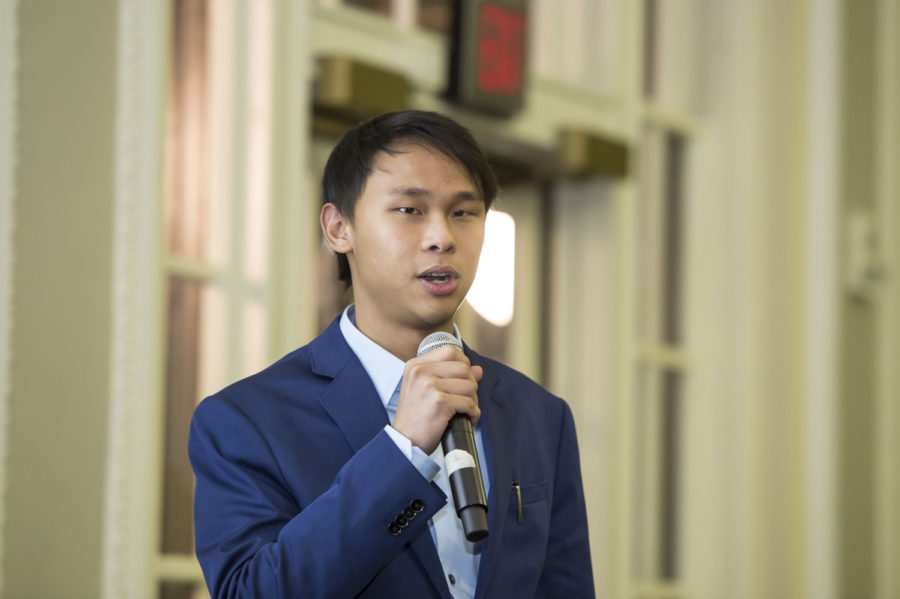Imagine being able to open a door and go from biting winds and snow to a warm, climate-controlled greenhouse that carries the aroma of fresh tomatoes — being harvested by robots roaming through the aisles.
For Brandon Contino and Daniel Chi, this fantasy is turning into a reality through their company Four Growers, as they aim to develop automated tomato harvesting robots to work in greenhouses.
Contino, CEO of Four Growers and a Pitt 2016 alumnus, takes the spokesperson role for the company, while senior mechanical engineering major Chi focuses on the technical side. The idea developed in April of 2017 when Contino and Chi began talking to tomato growers and associations.
“Dan and I knew we wanted to do something in an indoor farming or hydroponic growing place, so we decided to learn from those who were successful at it,” Contino said.
The two saw firsthand the issues facing modern-day tomato growing when they had their first greenhouse visit a month later with MightyVine — a sustainable tomato growing company in the Chicago area. These issues include weather variability, crop loss and population growth.
Contino’s conversation with the tomato growers made it clear that greenhouses are becoming the future of produce farming. The pair say greenhouse growing is more sustainable, versatile and efficient than traditional farming.
“They require 90 percent less water and provide consistent, yearlong, local, high-yield production with near-zero herbicide and pesticide use,” Contino said. “In fact, over 50 percent of fresh U.S. tomatoes are greenhouse grown.”
Despite the advantages greenhouse farming can provide, Contino said the largest limiting factors growers face are the cost, accessibility and reliability of their labor force.
“There are increasing shortages in workers, and the workers that they are able to find are inconsistent,” Contino said. “Growers desperately need automation to keep providing healthy, local produce at competitive rates.”
This is where Contino hopes Four Growers can provide a solution. Once fully developed, Contino said the automated harvesting robot could replace the role of a human.
“The tomato harvesting robot is able to go down greenhouse aisles, accurately identify ripe versus unripe clusters, harvest them from the plant without damaging them and place them in a cart to get sent back to the packhouse,” Contino said.
The robot — according to Contino’s estimates — will be able to harvest as much as a human, but do it more consistently at a lower cost.
While implementing robots could be more efficient, Four Growers also had to consider what it would mean to replace human labor. But they say that their robot would enable farmers to expand labor resources.
“By enabling this industry we’ll be able to increase the amount of fresh, … pesticide free, local produce greenhouse farms can produce,” Contino said. “It’s a win for the consumer, the greenhouse and the worker.”
So far, the company has developed a vision system for the robot that allows it to learn using artificial intelligence as it works. The two are currently refining a prototype, which they hope to test at major greenhouses.
“We are working with six different farms who wish to beta test our robot, and these farms collectively represent 20 percent of the U.S. and Canadian greenhouse tomato acreage,” Contino said.
For Contino and Chi, reaching the next stage is possible with continued support from Pitt’s Innovation Institute. Susan Dorff — manager for student programs at the Innovation Institute — worked alongside Four Growers since their inception. She said the company became involved with the Institute through student programming.
“We help [students] practice, learn, compete and get funding to continue with their idea,” she said.
Four Growers has been involved with several of the Innovation Institute’s programs, as well as competitions such as the Randall Family Big Idea Competition — an experience-based learning opportunity for Pitt students with big ideas that offers $100,000 in cash prizes.
Babs Carryer — the director of education and outreach at the Innovation Institute — said she has noticed distinct qualities in Contino and Chi’s approach between now and when she first met them.
“I think that the entrepreneurial lead is really important. I view Brandon [Contino] as sort of the driver of this project,” Carryer said. “A lot of student projects don’t quite have that strong a driver. Brandon’s really committed to doing this.”
Carryer said she was amazed by the amount of customer discovery the duo had done and the interest from tomato growers they received. Usually, Carryer sees entrepreneurs get nonspecific, general interest from companies that acknowledge their idea but never move beyond that. She believes the difference in Four Growers is their passion.
“They haven’t just been sitting on their laurels thinking about this. They’ve been actually out there really doing the deep work that’s necessary to advance an idea towards reality,” Carryer said.
As with any early product, there are still more hurdles on the road to completion. Carryer pointed out the challenge of realistically getting a robot to consistently harvest tomatoes without a problem, as well as Four Growers likely having to expand their team as their idea grows. Nevertheless, she believes in what Contino and Chi can do.
“I think they should be one of our leading student spinout companies, and I can’t wait to keep working with them on that,” Carryer said. “They definitely have what it takes.”



